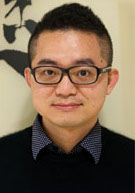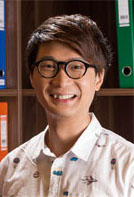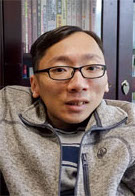通识教育模范教学奖 2016
时间: 3:45-5:30pm
地点: 香港中文大学邵逸夫堂留足展览厅
2016年度荣获提名的老师有十一位。教务会通识教育委员会议决颁发「通识教育模范教学奖」予大学通识教育部的郭柏年博士,历史系的吕永昇博士,以及地理与资源管理学系的王君杰博士。
郭柏年博士
吕永昇博士

Dr. Lui Wing Sing obtained his MPhil and PhD degrees in History from The Chinese University of Hong Kong. He is currently an Assistant Lecturer in the Department of History, teaching various courses in traditional Chinese society and history. He has offered four General Education courses, namely, UGEA2234 Imperial and Religious Power: The Transformation of Chinese Society and Culture, UGEA 2230 Introduction to Transformation in Chinese History, GENA 2322 General History of China and GECC4130 Senior Seminar since 2014.
I am honoured to receive the Exemplary Teaching Award in General Education. This award is particularly meaningful to me, as it recognizes my efforts in teaching and reminds me the wonderful experience of meeting students from different backgrounds over the past few years.

Most of our undergraduate students show their interests in history, but some also have negative views. For example, students believe they have to memorize a lot of materials about the past, which appear to be useless and boring and hence, wasting their time. As a history teacher, I try to make history alive for my students, especially for those who are not history majors. I try to arouse their interests and curiosity. I believe that it is important to develop courses in which students could learn to apply historical contents and methodology to they own disciplines.

The goals of my General Education courses are to help students gain some basic and fundamental ideas in histories; and to help them critically analyze and interpret the eras/ideas in Chinese history, focusing on important individuals, personalities, ideas and social events in history that have shaped the present societies. In each of the classes, I have deployed a variety of teaching methods to make my lessons lively and interesting. I would show excerpts of some movies to help students visualize an historical event. Outside the classroom, I have also organized some field trips and interviews so that students could learn history from the fields. Students would be guided to read historical materials for pleasure by researching their own family’s genealogy, caring about the minority groups, telling stories of their past, or travelling and visiting historic sites and museums.

General Education courses provide me the opportunity to reflect and re-organize my courses to introduce history to non-majors, and to re-visit the way to communicate the past events in history to the general public. By teaching these courses, I always re-discover the joy of learning alongside with my students. I hope that they will have broadened their horizons, and have had richer and more interesting lives as a result of their enhanced interests and enjoyment in studying history through my General Education courses.

王君杰博士

Dr. Wong Kwan Kit, Frankie is currently Lecturer in the Department of Geography and Resource Management at The Chinese University of Hong Kong, experienced in teaching remote sensing, geoinformation science and digital image analysis. He has been teaching the University General Education course UGEB2132 Earth as Seen from Space since 2011. He believes the role of a teacher is to boost students’ curiosity and stimulate them to learn and explore more outside the classroom. His creativity, patience and enthusiasm in teaching also enable him to get the Exemplary Teaching Award of the Faculty of Social Science in 2014.
I am truly honoured to receive the Exemplary Teaching Award in General Education. The General Education course titled Earth as Seen from Space was passed to me in 2011. I modified the course structure and content to make it more interactive with the students. Thus, not only is this award meaningful to me, but also recognizes the collective effort of colleagues in my department.
One of the goals of General Education is to help students jump out of their comfort zone and to learn subjects they are unfamiliar with, in which they somehow show a certain degree of interests. It is this little seed of curiosity that can be cultivated and blossomed into sustained motivation to learn. My strategy is to simply make the class interesting and to engage students in class through course design, in-class activity and innovative way of presentation.

Earth journey in the space is about the science of remote sensing. The subject seems unfamiliar to most people, not only students. I implant a lot of real life examples in course contents to demonstrate science is essentially everyday experiences. Starting from daily and personal encounters of a digital alarm clock waking one up in the morning; Google Map that guides one to identify the shortest path to a Michelin star restaurant; whether rain will come in the next couple of hours; tightknit plots in movies like Gravity; to global events of locating the debris of missing MH370 in the ocean and tracking the flow of volcanic ashes disturbing the air traffic. All these are prevalent to satellites which seem too far away but are in fact keeping an eye on us high up in the space. Using examples connecting to their daily experiences, students’ attention can be drawn and interests in the subject aroused. Most importantly, they would become aware of and start to be able to appreciate the presence of the influence of science and technology in their life, the society and even the world.
“Concepts lead the way; applications as showcases” is how the course is designed. Theoretical concepts of remote sensing are introduced in the first half of the course, and real-life applications focusing on how remote sensing is implemented in our society follow. In fact, the technology connects people’s life in many aspects. Students are encouraged to study the subject from different perspectives such as issues of practicability, technical and environmental considerations, etc. Through these examples and discussions, students are trained to think more critically.

‘Seeing’ from space is not enough, decoding messages from space is equally important. These messages are presented through images. The course emphasizes on developing skills to extract information from images, which is indeed a practice-make-perfect exercise. Other than traditional tutorial classes in which students can learn to cooperate and communicate with each other, an in-class game known as “Image of the Week” is designed to engage students throughout the learning process. The game is carried out in every lecture during the break and is facilitated by the student response system built in the classrooms. Students use their mobile phones, laptops or tablets to immediately respond to the preset questions in class. Designed as a game, students are not respectively graded and they are encouraged to use the skills they learnt in the course to tackle the questions. After the game, the correct answers are explained and the students will learn the analytical skills involved. The cumulative experiences and sharpened skills make them more confident in the ensuing ‘game’.

Quality teaching and learning experience in class would be affected by how content materials are presented and delivered to the students. The key ingredients are technology plus a bit of humor. Technology allows lecture contents to be delivered in a more creative and innovative way using well-designed graphics and animations which capture students’ attention in class. I present course contents in the form of a mind map which is effective in organizing thoughts and communicating ideas. While the contents can be discussed in depth, the linkages among different topics, as well as the whole picture, will not be lost. A bit of humor does ice-breaking and helps make the class more interesting.
The earth is mysterious; satellites reveal the unknowns to human-beings by capturing images from the space. Knowledge is limitless; teachers unveil the key to acquire knowledge by motivating students to learn with fun. On one hand, the journey from the space lets students know more about the earth. On the other hand, I hope students can endure the momentum to learn and use their knowledge to contribute to our homeland.





